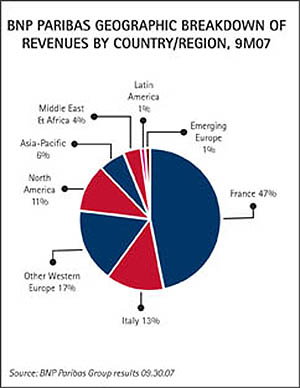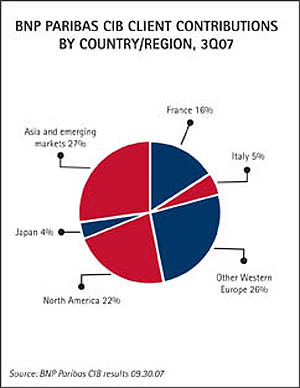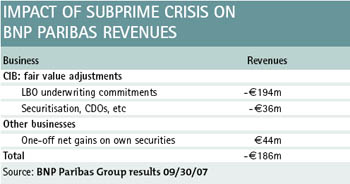BNP Paribas has been expanding its businesses globally, both through acquisition and organic growth, and the previously predominant French operations are slowly but surely decreasing in significance. In an interview with Brian Caplen, CEO Baudouin Prot says that the anchor to all the bank’s business remains its retail base.
Three years ago, BNP Paribas was predominantly a French operation. It had BancWest in the US but the bulk of its revenues came from France, where the majority of its 90,000 employees were based. Fast forward to 2008 and the picture looks completely different. French retail only accounts for 19% of group revenue. The corporate and investment banking (CIB) operation is a global business with more revenues out of Asia than out of France. Of group revenues, 78% is generated out of Europe – with Italy playing a key role – 11% out of the US and 11% from the rest of the world. There are significant investments in the Ukraine, Turkey and Libya (the bank sees the Mediterranean, the Middle East and north Africa as core territory) as well as a growing but less flamboyant presence in the BRIC countries: Brazil, Russia, India and China.
The head count has mushroomed to 160,000, of which a little more than a third (60,000) are based in France; 60,000 are based in the rest of Europe and 40,000 in the rest of the world. Following on from the critical takeover of Italy’s Banca Nazionale del Lavoro (BNL) in 2006, BNPP now has 20,000 employees in Italy.
Worldwide BNPP has 17 million retail customers and nearly 5600 branches up from 11 million customers and 3200 branches at the end of 2004.
“The progress in three years has been enormous,” says Baudouin Prot, the bank’s CEO. “We have done more in the past three years than at any other time since the transformational merger creating BNP Paribas in 1999, and that has been both in terms of external growth with the 800 branches of BNL and the purchase in the Ukraine, for example, but also organic growth. We have been opening branches in the emerging markets at a much higher pace than ever before.
“Four years ago, we were still very much French and more than half of the staff were here. We describe ourselves now as a ‘European leader with global reach’. We will remain predominantly European but with a global presence,” he says.
Not a crisis victim
BNPP also enters 2008 as one of the few banking heavyweights to be largely unscathed by the subprime crisis. True, it hit the headlines last August when it froze three of its money market funds when faced with difficulties in valuing the underlying portfolios of asset-backed securities. But BNPP has largely avoided using securitisation with its own balance sheet. Its exposure to leveraged buyout (LBO) finance was limited and BancWest has not been a major lender to subprime borrowers. In the third quarter of 2007, BNPP put the impact of the crisis at €186m due mainly to LBO underwriting commitments and exposure to securitisation and collateralised debt obligations (CDOs) in CIB. Full year results were due on February 22 after The Banker’s press deadline.
BNPP is known throughout the industry for its stringent risk management and just weeks before the crisis hit, it was upgraded by Standard & Poor’s to AA plus – one of only four banks with this rating and above now that UBS and Citigroup have fallen out of the group. The others are Rabobank, Wells Fargo and Bank of America.
“For us to have accessed that club just before the crisis was a great achievement, and even more so because of the agency’s rationale, which was quality of controls, strength of management, diversity of revenues and the ability to sustain growth during a downturn. The timing for us was superb and we can now access funding all over the world on better terms,” says Mr Prot.
Well-balanced business mix
Banking analysts have recognised BNPP’s healthy situation. “During the recent financial crisis, BNP Paribas illustrated its strong resilience thanks to its well-balanced business mix with low exposure to the US market and a fairly undeveloped securitisation portfolio,” says an industry report by Société Générale released in January. An equivalent note from Credit Suisse says: “We like BNPP because we believe that its well positioned CIB division should help it to be resilient in a challenging environment. We are not concerned about the possibility of a large value-destroying acquisition and we are not concerned about the group’s US subsidiary BancWest because it is a small component of the overall group and is not much exposed to riskier assets.”
Mr Prot says: “We entered the crisis in a relatively strong position. We were helped by our business mix with its emphasis on retail. The rating upgrade also helped, as did the fact that we had only €9bn exposure in conduits, which compared favourably with most of our competitors, and no SIVs [structured investment vehicles] at all.
“We never relied on securitisation to any great extent. At a group level, it amounts to €15bn, which is negligible compared with the size of the balance sheet €1400bn. Banks that were distributing their retail assets now face a problem but we always kept ours [on balance sheet]. In terms of direct subprime, the figure at BancWest is $155m out of $13.3bn and $280m in the investment portfolio out of $9bn,” he says.
Mr Prot says that there was a certain pressure at times from CIB business lines to take on more risk but that both he and the bank’s two chief operating officers, Georges Chodron de Courcel and Jean Clamon, take a direct role in risk management and have a clear view of the risks that the bank wants to take on. Mr Prot chairs the provisions committee and no provision above €1m can be taken on without his knowledge.
“Banking is about risk so if you don’t want to take risk you have to move to another industry. But if risk is your raw material, you have to touch it and stay close to it because that’s what you manage and sell,” he says.
BNPP’s great feat has been for the senior management to keep this much in touch with the details of day-to-day operations at the same time as executing a longer term strategy. How has this been managed? A key learning exercise was the 1999 merger between BNP and Paribas, when the tricky cultural integration of a retail bank with an investment bank was managed smoothly. After that the BNPP executives who handled the merger – many of whom are still at the bank, in particular chairman Michel Pébereau, who was both chairman and CEO at the time – wrote down their experiences in the form of a 100-page “takeover cookbook” that has been used as a guide in subsequent deals, most notably the BNL acquisition. Stealing the book will be of little use to competitors, however, because success still depends (to use a classically French culinary metaphor) on the skills of the chefs.
The right takeover recipe
“My mother is a great cook but she works without any recipes and the only dessert she can explain how to make, in a way that the rest of us can follow, is chocolate cake,” says Mr Prot. “You have to have the special ingredient [in acquisitions].”
In management terms, he sees this ingredient as being both expert in the relevant field of banking but also having the leadership skill to manage the integration and any cultural differences. A key challenge is to help the staff of the acquired bank to feel that they are contributing something and that the merger is not just a colonial conquest. For the BNL integration, BNPP’s head of French retail Jean-Laurent Bonnafé was put in charge of BNL too and so was able to pick a handful of key retail executives who could assist with the integration.
In the case of the BNL acquisition and Santander’s takeover of Abbey in the UK, the former prejudice of analysts that only domestic mergers could produce cost gains has been dispelled. What both BNPP and Santander have proved is that there is huge upside in acquiring good but poorly run franchises and making them more efficient.
“You need to have the vision but also to seize the opportunity,” says Mr Prot in reference to BNL, for which BNPP paid €9bn. “It turned out to be the last opportunity to get a strong brand and national franchise in Italy. BNL changed the face of the group. We became much more European overnight.” The bank gained a lot of confidence from the deal, he says.
BNPP has also made considerable headway in emerging markets, with key purchases in the Ukraine, Turkey and Libya, as well as ramping up its operations in the BRIC countries. Critical to this expansion was assigning members of the executive committee to look after geographical regions as well as their business lines as a way of focussing the bank on different parts of the world.
“We decided a year-and-a-half ago that some members of the executive committee would take responsibility for a country or region to promote the group strategy in those places. It was a very simple thing to put into effect, but it has been a very powerful tool and has overcome the dominance of the business lines that existed after the merger between BNP and Paribas,” says Mr Prot.
As a result, Mr Prot looks after the US; Georges Chodron de Courcel takes care of the Ukraine, Turkey, Russia and the Gulf; Jean Clamon is responsible for Brazil, China, Germany and Spain; asset management services boss Alain Papiasse is in charge of India and Korea; head of CIB Jacques d’Estais looks after the UK and Asia-Japan; and the boss of international retail, Pierre Mariani, oversees the Maghreb countries.
By the time that decision was made, international deals were already unfolding at a moderate rate. In early 2005, for example, BNPP took 50% of the holding company that controls Türk Ekonomi Bankasi (TEB) and in December 2005, it acquired 51% of UkrSibbank in the Ukraine. Even more groundbreaking was the acquisition of 19% of Sahara Bank last July making BNPP the first foreign bank to develop full-service banking activities in Libya.
Moving into the BRIC countries
In the BRIC countries, BNPP’s presence is less dramatic but equally methodical. In Brazil, where the cost of a major acquisition would be huge, the bank has adopted what it calls its “retail-lite” strategy using Cetelem, its consumer credit arm. Last July, Cetelem acquired Banco BGN, a Brazilian bank that is a leader in consigned credit – repayments debited directly from salaries. This gives it a substantial presence without the need for a huge branch network.
In China, BNPP bought 19.2% of Bank of Nanjing, a regional player based in Jiangsu province, which has been diluted to 12.2% following the Chinese bank’s recent initial public offering.
In India, BNPP has acquired 27% of online brokerage Geojit, has taken a stake in a mortgage company and is waiting for approval for a stake in an equipment finance company. It partners with State Bank of India (SBI) in the distribution of life insurance and has 26% of SBI’s life insurance arm. CIB has eight regional operations in India.
In CIB globally, BNPP has developed expertise in particular areas where it can compete against the bulge bracket firms such as in equity derivatives, the financial institutions’ group business, and energy, commodities, export finance and project finance, an area in which broker Keefe Bruyette & Woods (KBW) classes it as a top three player worldwide. Two key projects in 2007 were the financing of Nevada Solar One, the largest solar power plant in the US, and an offshore wind turbine field in the Netherlands. About 80% of BNPP’s revenues come from clients illustrating the lesser role played by proprietary trading.
In the end, though, everything at BNPP comes back to retail. Is the huge enthusiasm for retail inspired by the current gloom surrounding capital markets and investment banking? “We never dropped retail,” says Mr Prot. “We are not returning [to retail] as we have always stuck with it. Our business model is very simple. We like retail franchises into which we can cross sell asset management and CIB products. But the anchor is the retail base.”





